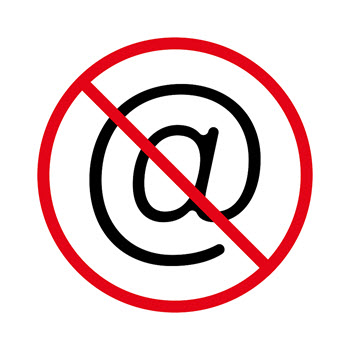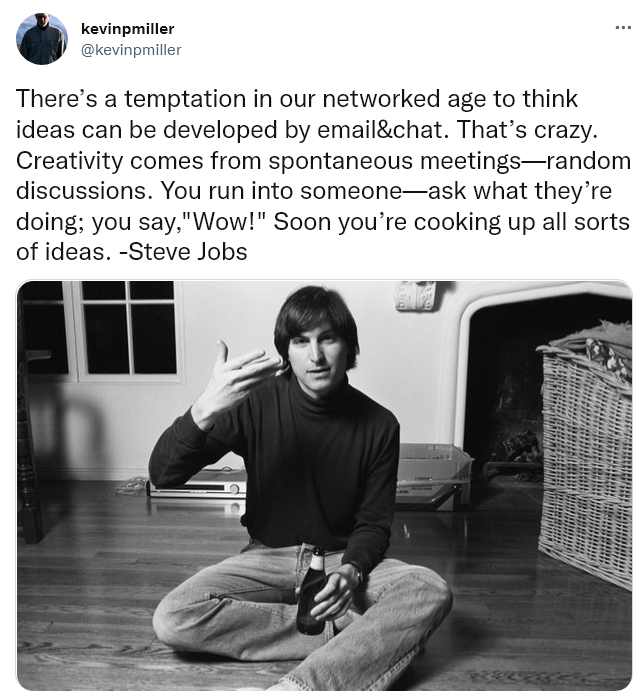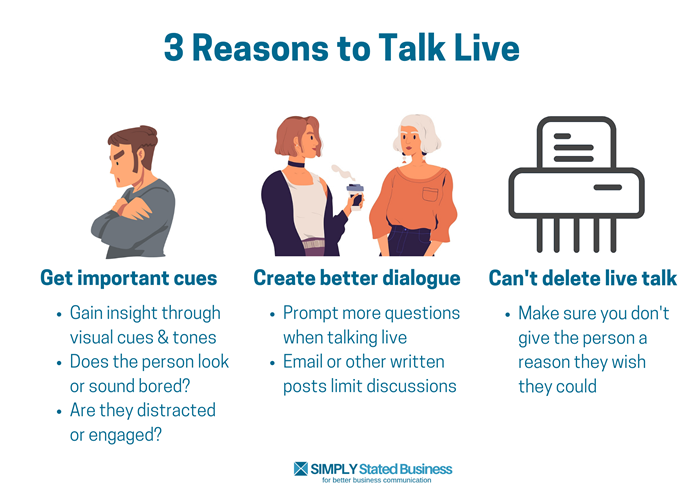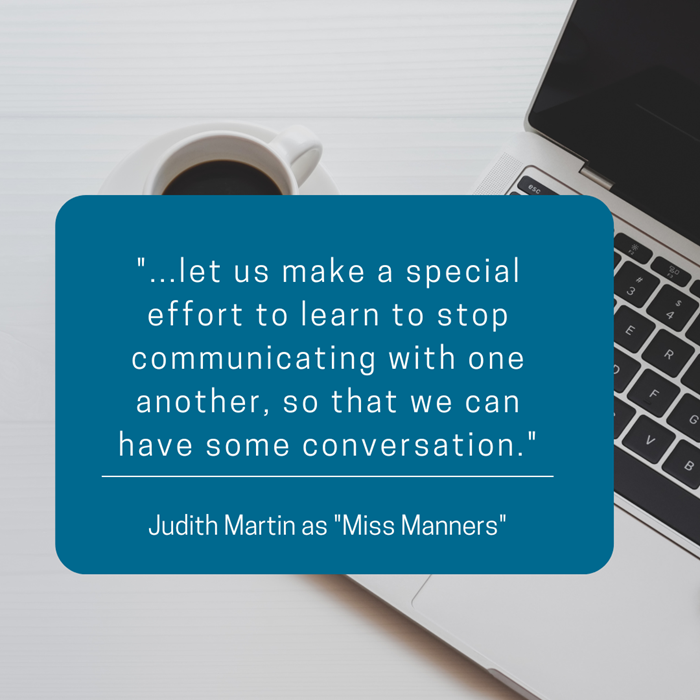 Can we talk? You know – without our fingers tapping on some smartphone or keyboard. When did talking live go out of style?
Can we talk? You know – without our fingers tapping on some smartphone or keyboard. When did talking live go out of style?
Sure, the pandemic upped the number of calls sent to the black hole of voicemail. But seeing how this post originally published in 2010, we can’t blame the pandemic for this one.
- Today we tweet, text, post, write on walls, but seldom talk.
- Some would blame it on social media.
- But was live talk silenced long ago?
Can We Talk?
The University of Phoenix has a TV ad that recommends a man look for the signs that are all around us. While on Twitter this morning, I saw this tweet from someone I know. 😉

Next, I went to this blog to see which post I wanted to update in my quest to clean up old posts. Guess which one jumped out at me? The signs pointed to this one. 😊
While some may say, “Yeah, but that statement from Steve Jobs was obviously a long time ago,” it remains relevant. The pandemic may have given us an excuse to make talking live scarcer. However, history proves we’ve avoided live conversations for a long time.
Stone Age Talk
Do you remember back in the Stone Age when customer service was a business letter and a stamp?
Believe it or not, they had phones back then. But rather than pick up the phone (even on the simplest of problems) businesses snail mailed letters instead. Even customers used snail mail (boy, am I dating myself).
- Was there an aversion to phones?
- Or too many attorneys who insisted on everything in writing?
Ironically, some of my worst experiences have been with the phone company.
- Is that what put people off live conversations?
- Did it start when some productivity genius decided the automated phone prompt was a great business strategy?
Cubicle clones email rather than get up and talk to coworkers – even those across the cubicle wall. I often shouted –
Hello. I’m sitting right here. Talk to me.
Business people complain about how they hate wasting time talking on the phone. Yet they see no problem in sending email chains longer than the Continental Divide.
Can you hear me now?
Technology is amazing. Today’s tablets sure beat the Stone Age tablets.
But sometimes it feels like you must hit a person over the head with that tablet to get him to talk to you. Although that may not lead to a conversation you’d want to hear.
It’s no secret, I like things simple. I would rather have a five-minute phone call to clarify something than take much longer writing an email.
I understand the business need for putting things in writing, but there is also a real business need to connect live. Below are three reasons to talk live.

If social media is all about connecting, why not reach out and touch someone? Have we lost the fine art of live conversation? What do you think? Share your thoughts in Comments.

Note: This post was updated on May 1, 2017 from its original publication on April 7, 2010. This October 16, 2022 version updates it again, yet technology marches on.
=====================
Helping you Keep it simple, clear & uniquely yours
====================

I mostly agree… although today I was able to solve my blog-down-tech problems through hostgator’s chat window of all things… worked like a charm… I tried it while I was on hold on the phone.
Love the quote.
.-= Anne Wayman´s last blog ..Tweets From Freelance Writers =-.
Technology certainly has its place. I love the chat feature. It’s the quick question that doesn’t require documentation where I prefer to just call.
Glad you’re back up, Anne. And I thought that quote nailed my point. If only I thought of it! 🙂 Thanks for stopping by, Anne.
There is a vast difference between a face-to-face event than a telephone conversation. Which is also different from a written one.
But, there are advantages to each. F2F, as you indicated, lets us discern nuances that are often devoid of our phone discussions.
And, too often, phone calls are made to the time and place benefit of the caller- not the recipient. Which immediately taints the content, if the recipient has other items on his/her agenda to accomplish NOW.
The written communication offers us the opportunity to hone our message, ensuring we cover the points we wish – in the order desired.
All these are VASTLY different from the mishmash we receive via texts. Which miss the values of each mentioned above. And, most importantly, when one is sitting next to a friend in conversation, WHY is there a phone out with your fingers typing a message to him/her- or worse- another?
Oh, if any of you are thinking of getting back to me on this- call or write. I have always blocked texts! That solved my problem! 7 years ago: http://www.adjuvancy.com/wordpress/i_really_want_2_tell_u_something/
I think there is a place for most forms of communication. Even text, under certain circumstances. I agree, Roy, there are advantages to each. And, totally agree that checking messages or texting on your phone while you are supposed to be having a conversation is beyond rude.
Hi Cathy. I freely admit that I prefer to communicate by email. I like it because it allows me to send the information that I need to send when it is convenient for me and it will wait in the recipient’s mailbox until it is convenient for them, and it’s faster than snail mail. We don’t have to coordinate our schedules.
However, when there is another method that is more appropriate for a situation then I will use it.
Text messages are great for status updates. My wife made it to work, she’s heading home, the package I was expecting arrived. I think those are ideal for text. People think that text messages are instant and reliable. They’re not. I can text my wife that I am on my way home from the neighbor’s house 5 minutes away and arrive before the text.
Texting is not great for a real-time conversation. In those cases there is nothing better than the phone unless you can be face-to-face. I hate trading a long string of texts or emails when a 5 minute phone conversation could get it done and out of the way with less fuss.
Sounds like you and I are on the same wave length, Wayne. 🙂 I think each communication mode has its place. We just need to guard against it going from a tool to a barrier to communication.
Nice to see you here, Wayne. Thanks for sharing your thoughts.